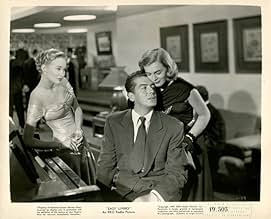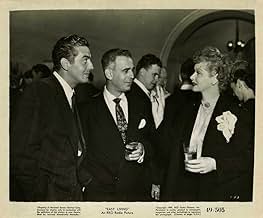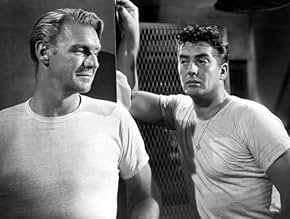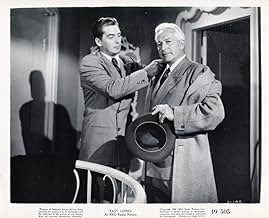IMDb RATING
6.3/10
1.1K
YOUR RATING
Star footballer Pete Wilson faces a career-threatening condition. His wife Liza enjoys the glamorous lifestyle, while shunning has-beens. His friend Tim retired to coach. Pete only knows foo... Read allStar footballer Pete Wilson faces a career-threatening condition. His wife Liza enjoys the glamorous lifestyle, while shunning has-beens. His friend Tim retired to coach. Pete only knows football.Star footballer Pete Wilson faces a career-threatening condition. His wife Liza enjoys the glamorous lifestyle, while shunning has-beens. His friend Tim retired to coach. Pete only knows football.
Richard Erdman
- Buddy Morgan
- (as Dick Erdman)
Jim Backus
- Dr. Franklin
- (as James Backus)
- Director
- Writers
- All cast & crew
- Production, box office & more at IMDbPro
Featured reviews
1949 sleeper from RKO. At that early date pro football was still in its infancy. Thus a movie dealing with the subject must have seemed like a piece of exotica and I doubt the production made any money. Sixty years later, however, the Charles Schnee script and Jaques Tourneur direction stand as a perceptive glimpse into pro-sports at the high end, as valid now as then and definitely ahead of its time.
Star quarterback Victor Mature is a regular guy, but is drawn into the fast lane by ambitious wife Liz Scott. She's all glamor and ego, eager to hang on to her headline husband. The scenes of urban highlife and sophistication are particularly well done-- the penthouses and sleekly groomed sharks swimming around eyeing new prey. Vic's uncomfortable and senses glamorous snares, but Liz sees only social climbing opportunity, while souless, silver fox Art Baker is only too happy to oblige. In a word she strays.
On the other hand, good guy Sonny Tufts (in a tailor made part) and salt-of-the-earth wife Jeff Donnell represent the other side of Mature-- his down-to-earth side. He's drawn in both directions, and it's this conflict that sets the dramatic stage. Will he hang on to Liz and the easy life or settle for a meagre coaching job with pal Tufts. He'll have to decide because the old ticker has become a problem. In short, he's facing a crisis of values.
One scene really worth noting. The team has cut journeyman lineman Gordon Jones. He's the kind of player who eats dirt every week so the quarterback can look good. Behind him are a thousand more grunts waiting to take his place. Now he wants a piece of a tavern and a place to hang his jersey and maybe a little dignity for all the pain. Watch his quick, knowing reactions to the snobbish Liz as she ignores this "loser". What a great line when he refuses the ride next to her, saying, "The subway's good enough for me". It's a whole little morality play summed up in a few seconds.
Unfortunately the film shows its period with an unsatisfactory Hollywood ending consistent with the conventions of the day, and enough to make modern-day feminists apoplectic. Then too, the Lucille Ball role seems overdrawn and unnecessary. Nonetheless, the supporting cast is outstanding, blending easily into a smoothly executed production that again demonstrates the industry's polished level of professionalism. Definitely deserves a second look.
Star quarterback Victor Mature is a regular guy, but is drawn into the fast lane by ambitious wife Liz Scott. She's all glamor and ego, eager to hang on to her headline husband. The scenes of urban highlife and sophistication are particularly well done-- the penthouses and sleekly groomed sharks swimming around eyeing new prey. Vic's uncomfortable and senses glamorous snares, but Liz sees only social climbing opportunity, while souless, silver fox Art Baker is only too happy to oblige. In a word she strays.
On the other hand, good guy Sonny Tufts (in a tailor made part) and salt-of-the-earth wife Jeff Donnell represent the other side of Mature-- his down-to-earth side. He's drawn in both directions, and it's this conflict that sets the dramatic stage. Will he hang on to Liz and the easy life or settle for a meagre coaching job with pal Tufts. He'll have to decide because the old ticker has become a problem. In short, he's facing a crisis of values.
One scene really worth noting. The team has cut journeyman lineman Gordon Jones. He's the kind of player who eats dirt every week so the quarterback can look good. Behind him are a thousand more grunts waiting to take his place. Now he wants a piece of a tavern and a place to hang his jersey and maybe a little dignity for all the pain. Watch his quick, knowing reactions to the snobbish Liz as she ignores this "loser". What a great line when he refuses the ride next to her, saying, "The subway's good enough for me". It's a whole little morality play summed up in a few seconds.
Unfortunately the film shows its period with an unsatisfactory Hollywood ending consistent with the conventions of the day, and enough to make modern-day feminists apoplectic. Then too, the Lucille Ball role seems overdrawn and unnecessary. Nonetheless, the supporting cast is outstanding, blending easily into a smoothly executed production that again demonstrates the industry's polished level of professionalism. Definitely deserves a second look.
A profesional football player is confronted with terrible medical diagnosis. He is only a fottball player ; too late to become someone else. It is high paid, preocuped by the happiness of his wife ( preocuped, herself, by only her succes ) , losing the opportunity to be the new couch of team and feeling his life empty, decided to hide his health problems and accepting be mocked by his team mates for not brilliant succeses in games.
Victor Mature proposes a fair portrait of Pete Wilson and he was the main motif for see this film in my case. But the revelation remain Lucille Ball as Anne and, no surprises , Sonny Tuffts.
In short, a good, in some measure, maybe, useful film.
Victor Mature proposes a fair portrait of Pete Wilson and he was the main motif for see this film in my case. But the revelation remain Lucille Ball as Anne and, no surprises , Sonny Tuffts.
In short, a good, in some measure, maybe, useful film.
Victor Mature plays the star quarterback of the Rams and he's on top of the world. Unfortunately, after feeling some twinges, his doctor discovers Vic has a heart defect and might easily die if he continues playing. Well, at first it's a no-brainer, as he plans on retiring and taking up coaching. Unfortunately, these plans are put on hold when he tries to tell his selfish shrew of a wife (Lizabeth Scott) about this. She makes it VERY clear that she loves him because of all the money and glory he gets from football AND if he were to quit, she might just walk! Nice lady, huh?! Lucille Ball plays a supporting role as a nice lady who deeply cares for Vic and is just waiting in case the marriage fizzles. However, how all this marital discord is finally solved is amazing and could NEVER be done in films today, as Vic finally gets sick of Lizabeth's petulant ways and slaps her silly--saying to either shut up and stay or walk!!! This is a small picture with a modest cast and budget, but I have really enjoyed watching it repeatedly. Part of it is because there are few films about pro football (especially when this one was made) and because as I watch the big climax scene between Victor Mature and Lizabeth Scott, I love to imagine the horror on many viewers faces as they see Vic slap his awful wife right in the face! Believe me, most viewers will probably LIKE seeing this, as she's one of the most selfish and awful wives in film history. Now I am NOT recommending men slug their wives, but in this age of extreme political correctness, I occasionally like to see a film that is sure to offend a lot of high-strung viewers! If you take out this possibly offensive scene, it's still a dandy movie--well worth a look. An interesting story and one of Mature's better films.
There are two stories here. The stronger one deals with a quarterback for the New York Chiefs pushed toward retirement by a heart murmur. This story offers interesting glimpses at the state of professional football, circa 1949. The team takes the train to "away" games, for instance, and it seems to have only one black player. And get this --making the Championship Playoffs means at least an extra $1000 for every man on the team! (But this was in an era of nickel pay-phone calls, when college football coaches made $3200 a year.)
The other story centers on the quarterback's troubled relationship with his ambitious, social-climbing wife who's not above using her seductive charm to make a success of her interior decorating business. Here again there are intriguing insights into the world of 1949, where "uppity" women had to be taken down a notch or two lest they forget their proper roles as wives and mothers.
These two stories don't merge particularly well, resulting in an awkward blend of "locker room" and "Park Avenue," and the ending seems forced and unconvincing. (This may have been due to the Production Code's dim view of divorce.) However, the cast still makes the movie worth a look, with solid work from Lucille Ball, Lloyd Nolan, Jim Backus, Art Baker, Jack Paar, etc. Lizabeth Scott -- she of the spectacular eyebrows -- seems a tad "overheated" as the self-centered wife but the script probably forced this kind of performance. Victor Mature has the better part and he acquits himself in adequate fashion. In his locker room scene he gets to strip off his shirt and thus reveal one of the great torsos in the movies. (And how gloriously it was soon to be whipped and otherwise tortured in such films as "Samson and Delilah," "The Robe," "Zarak," and "Timbuktu.") Too bad the movie as a whole isn't equal to its star's chest measurement.
The other story centers on the quarterback's troubled relationship with his ambitious, social-climbing wife who's not above using her seductive charm to make a success of her interior decorating business. Here again there are intriguing insights into the world of 1949, where "uppity" women had to be taken down a notch or two lest they forget their proper roles as wives and mothers.
These two stories don't merge particularly well, resulting in an awkward blend of "locker room" and "Park Avenue," and the ending seems forced and unconvincing. (This may have been due to the Production Code's dim view of divorce.) However, the cast still makes the movie worth a look, with solid work from Lucille Ball, Lloyd Nolan, Jim Backus, Art Baker, Jack Paar, etc. Lizabeth Scott -- she of the spectacular eyebrows -- seems a tad "overheated" as the self-centered wife but the script probably forced this kind of performance. Victor Mature has the better part and he acquits himself in adequate fashion. In his locker room scene he gets to strip off his shirt and thus reveal one of the great torsos in the movies. (And how gloriously it was soon to be whipped and otherwise tortured in such films as "Samson and Delilah," "The Robe," "Zarak," and "Timbuktu.") Too bad the movie as a whole isn't equal to its star's chest measurement.
It is difficult to determine where this story is set -- period. The sports team in "Easy Living" is the Chiefs, the helmets worn by this teams are those of the Rams, but yet this team (and ultimately, this story) is based in New York City.
Well, the Kansas City Chiefs began as the Dallas Texans and never existed as a franchise in New York City. The St. Louis Rams, and their iconic ram horn helmet design, has only been seen in three markets, Cleveland, Los Angeles and St. Louis. Again, a club that was never in New York City.
It is also more than odd that the main character, a quarterback, wears number 66, not a customary number for a quarterback to wear. But, it is this lack of accurate detailing that reveals a project mired in vagaries.
These type of historical inaccuracies reveal a more deep-seated lack of focus from this film. Despite its promise, Easy Living just lacks any type of focus. The plot slides around seemingly unsure of where it wants to go or needs to go. primarily, the essential points in the plot development are buried behind a lot of pointless distractions...and characters.
This perpetually 'out-of-focus' plot is enhanced by dialog which is trite, and contrived. It seems the writers of this screenplay were hellbent on being melodramatic and vague.
The movie seems to starts somewhere in the middle. Unfortunately, Easy Living runs like a stage play that is missing too many essential scenes, not just the beginning!
Well, the Kansas City Chiefs began as the Dallas Texans and never existed as a franchise in New York City. The St. Louis Rams, and their iconic ram horn helmet design, has only been seen in three markets, Cleveland, Los Angeles and St. Louis. Again, a club that was never in New York City.
It is also more than odd that the main character, a quarterback, wears number 66, not a customary number for a quarterback to wear. But, it is this lack of accurate detailing that reveals a project mired in vagaries.
These type of historical inaccuracies reveal a more deep-seated lack of focus from this film. Despite its promise, Easy Living just lacks any type of focus. The plot slides around seemingly unsure of where it wants to go or needs to go. primarily, the essential points in the plot development are buried behind a lot of pointless distractions...and characters.
This perpetually 'out-of-focus' plot is enhanced by dialog which is trite, and contrived. It seems the writers of this screenplay were hellbent on being melodramatic and vague.
The movie seems to starts somewhere in the middle. Unfortunately, Easy Living runs like a stage play that is missing too many essential scenes, not just the beginning!
Did you know
- TriviaThe white football seen in the warm-ups for the night game at the end of the film was used in the NFL for such games from 1929 to 1955. It was considered to be more visible to the players and fans than the typical brown football. By 1956 better stadium lighting, especially needed for television, made the white football obsolete.
- GoofsThough the team's name is the Chiefs, their helmets have horns on them like the NFL's Los Angeles Rams.
- ConnectionsFeatured in After the Fox (1966)
- How long is Easy Living?Powered by Alexa
Details
- Runtime
- 1h 17m(77 min)
- Color
- Aspect ratio
- 1.37 : 1
Contribute to this page
Suggest an edit or add missing content






































